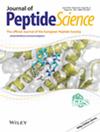Solid-Phase Synthesis of Peptide Hydrazides: Moving Toward Green Chemistry
Abstract
Peptide hydrazides are widely applied as precursors of peptide thioesters, valuable building blocks for the synthesis of proteins by native chemical ligation. In addition, they can be applied for the selective modification of cargo or carrier molecules using hydrazone ligation technique. In this work, we describe key aspects of solid phase synthesis of peptide hydrazides on hydrazine 2CT and hydrazone resin. Special attention is paid to the optimization of synthetic procedures using “preferred” and “usable” organic solvents. Thus, optimization of 2-CTC resin loading with Fmoc-hydrazine permits to reduce reagents consumption and avoid DMF and DCM application. The final products can be released from the polymer support with simultaneous BOC removal with 5% HCl (aq) in acetone. Although this protocol demands subsequent peptide deprotection to remove other protecting groups, it benefits of significantly reduced TFA consumption. Because of improved stability in acidic conditions and the possibility of selective Mtt removal and peptide cleavage in green solvents, hydrazone resin can be considered as a useful alternative for peptide hydrazides synthesis. Obtained results can simplify the synthesis of peptide building blocks for native chemical ligation using CMR-free reagents and solvents.


 求助内容:
求助内容: 应助结果提醒方式:
应助结果提醒方式:


